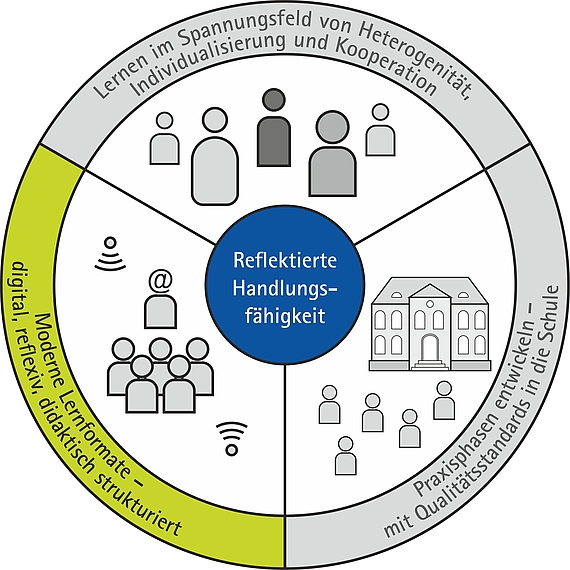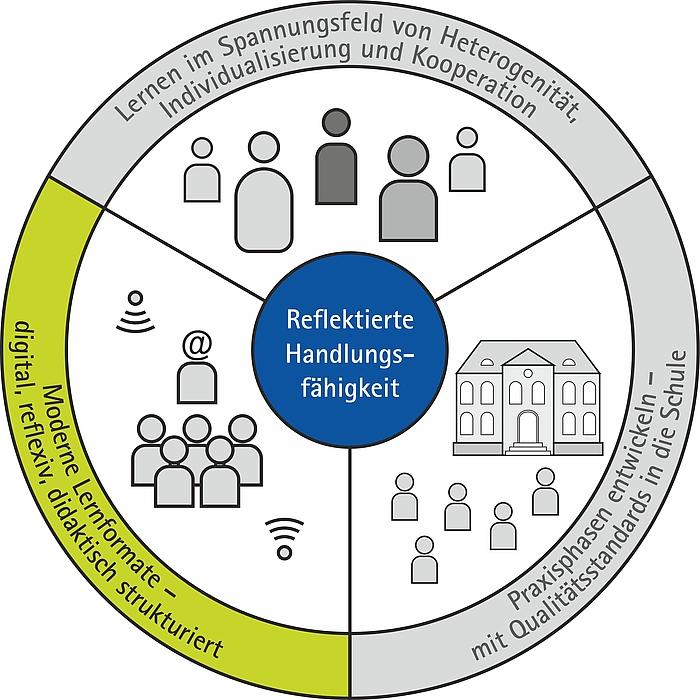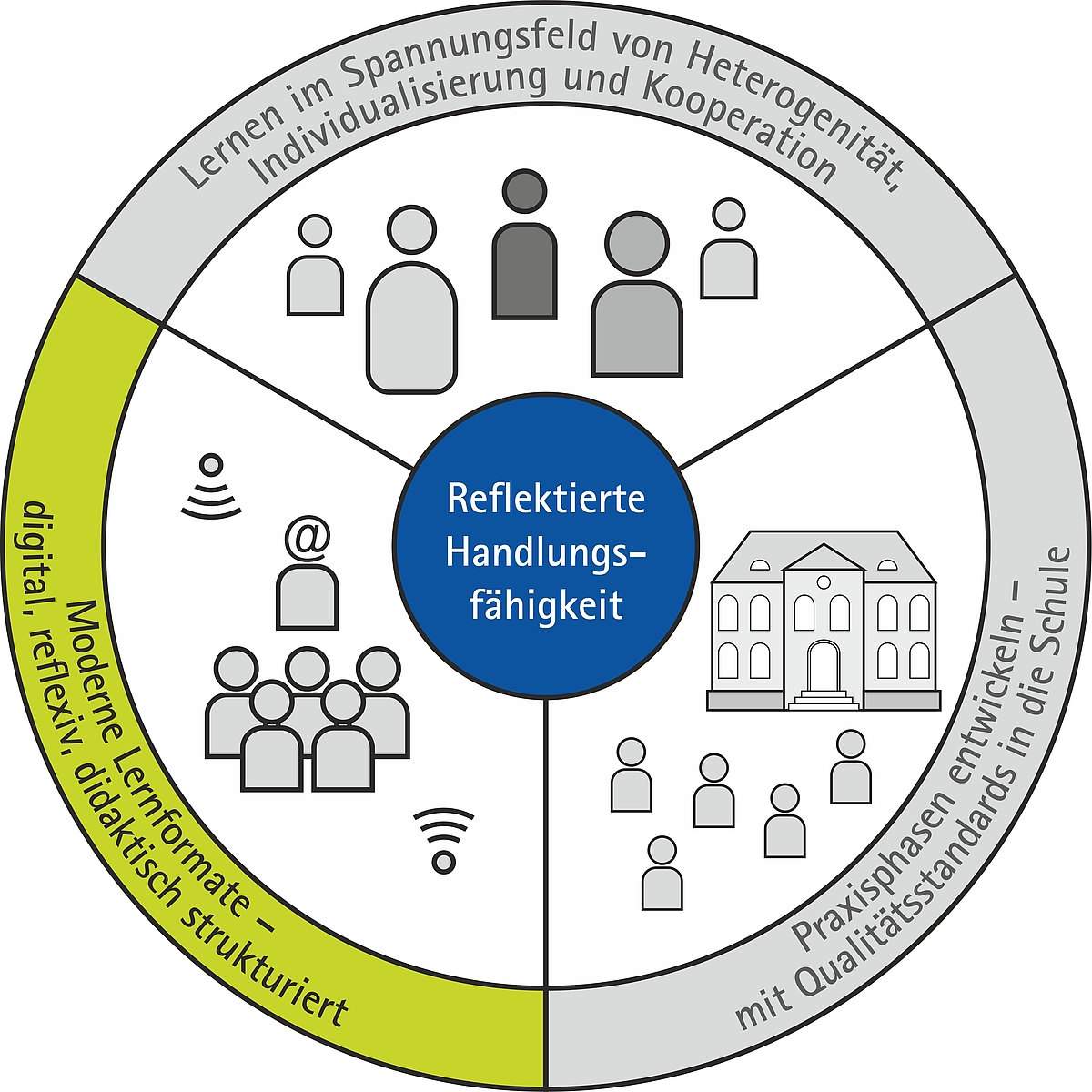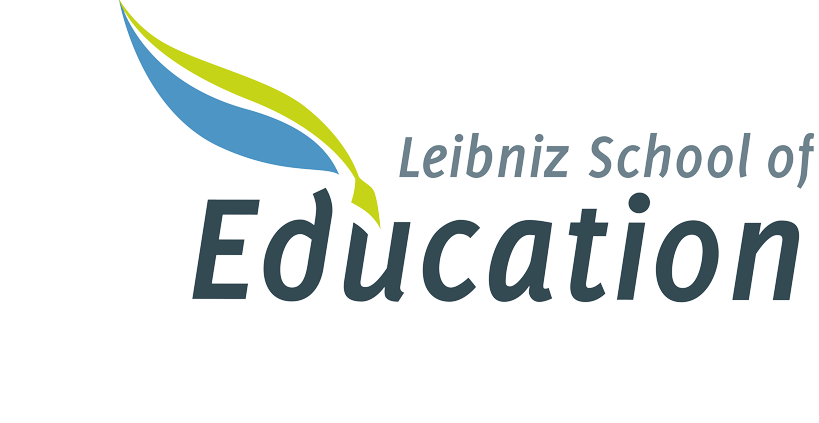


The following four work packages will be carried out in field of action 2:
-
Addressee-appropriate support of classroom and self-learning phases: Development of specific forms of support - blended learning, flipped classroom, research-based learning - for students with different prerequisites; digitally supported collaboration formats.
-
Reflective handling of own teaching and learning experiences: Students change their perspective from learner to teacher; reflective components for dealing with self-learning phases and for linking subject-specific content with professionalisation areas
-
Making digital teaching tangible: design space accompanied by subject didactics in which students develop and test their own digitally supported teaching.
-
Academic forum: Cooperation space across phases for questions of didactic structuring of teaching-learning formats
-
Prof. Dr. Jutta Papenbrock & Marcel Bonorden, Institute of Botany
Media in competence-oriented teaching and learning events using the example of 3D modelling and 3D printing
Prof. Dr. Jutta Papenbrock & Marcel Bonorden M. Sc.
Initially starting from biological and chemical learning contents such as blooms or polymerisation, teaching concepts and materials for computer-assisted modelling and subsequent 3D printing are developed and elaborated. The teaching concepts will be tested in cooperation with schools and evaluated and successively improved with the help of teachers and students. The aim of the project is to promote the introduction of 3D printing technology in the classroom through training, concepts and materials.
-
Prof. Dr. Tabea Becker & Benjamin Haag, German Seminar
Modern learning formats of German language didactics in theory and practice
Prof. Dr. Tabea Becker & Benjamin Haag
Modern learning formats will be tested, e.g. digitally supported portfolio via wikis (Stud.IP), digitally supported peer feedback/reflection via Ilias and product-oriented seminar design in the context of digital teaching (e.g. explanatory films).
Further links and information:
-
Prof. Dr. Reinhard Hochmuth & Sarah Khellaf, Institute for Didactics of Mathematics and Physics
Professionalisation and Linking of Subject and Didactics: Theoretical Foundation and Development of an Introductory Mathematics Didactics Course
Prof. Dr. Reinhard Hochmuth & Sarah Khellaf
The sub-project in mathematics didactics is a design research project that aims, on the one hand, to formulate theoretical foundations for the design of introductory mathematics didactics courses and, on the other hand, to develop and further develop a concrete course, taking into account the current theoretical status, and to evaluate it with regard to specific aspects using quantitative and qualitative methods. The focus here is on the topics of 'professionalisation' and 'networking of subject-specific science and subject-specific didactics'.
-
Prof. Dr. Gunnar Friege & Muriel Schaber, Institute for Didactics of Mathematics and Physics
Media competence in the physics practical course
Prof. Dr. Gunnar Friege & Muriel Schaber M.Ed.
How do future physics teachers use (digital) teaching media? The sub-project of the Physics Didactics Group is investigating this question and examining the students' use of media in the physics practical course. Within the framework of case studies, a planning and reflection interview is conducted with the students for a concrete lesson. This is supplemented by a partially standardised observation of the corresponding lesson. The collected data will be evaluated against the background of relevant competency framework models in the area of professional digitalisation-related competencies.
-
Prof. Dr Bettina Lindmeier & Frank Pätzold, Institute for Special Needs Education
Implementation of target group-oriented digitally supported teaching/learning formats to promote the ability to reflect and increase the participation of all students
Prof. Dr. Bettina Lindmeier & Frank Pätzold
Students of special education show great heterogeneity with regard to characteristics such as disability, social background or previous study-relevant experiences. In a blended learning lecture, addressee-appropriate digitally supported teaching/learning formats are implemented, whereby access barriers are to be reduced, reflexive engagement with biographical prerequisites and academic texts is to be promoted and digital competences are to be increased. Frank Pätzold's doctoral project analyses students' experiences and their biographical self-design on the basis of (educational) biographical interviews using objective hermeneutics.
Selected, project- and topic-related (german) publications
Becker, T., Busche, N. & Haag, B. (2022). Erklärvideos und Fachtexte im Vergleich: Lernmedien in der fächerübergreifenden Lehramtsausbildung. In R. Hochmuth, T. Becker, L. Kempen (Hrsg.), Hybride Lehre in den Fächern und im Lehramt. Forschung als Impuls für eine fach- und studiengangbezogene Lehrentwicklung an Hochschulen. TH Köln, S. 179-195.
Bonorden, M., Meinders, K., Offermann, S., Riemenschneider, A. & Papenbrock, J. (2022). Biologieunterricht praktisch und digital: Kompetenzorientierte Lehr-Lernarrangements zur Modellierung von Blütenmodellen mit 3D-Druck. In Biologie in Unserer Zeit. 52(1), S. 80–88.
Bonorden, M. & Papenbrock, J. (2022). Evidence-Based Optimization of Classroom Teaching Units Using 3D Printers for Designing Models—From the 2D Picture to the 3D Flower Model. In Education Sciences, 12(11), 831.
Khellaf, S. & Hochmuth, R. (2022). Die digitale Umsetzung einer praxisorientierten Lernaktivität für Lehramtsstudierende. In R. Hochmuth, T. Becker, L. Kempen (Hrsg.), Hybride Lehre in den Fächern und im Lehramt. Forschung als Impuls für eine fach- und studiengangbezogene Lehrentwicklung an Hochschulen (S. 113-134). TH Köln.
Khellaf, S., Hochmuth, R. & Peters, J. (2021). Aufgaben an der Schnittstelle von Schulmathematik, Hochschulmathematik und Mathematikdidaktik. Theoretische Überlegungen und exemplarische Befunde aus einer einführenden Fachdidaktikveranstaltung. In R. Biehler, A. Eichler, R. Hochmuth, S. Rach, N. Schaper (Hrsg.), Lehrinnovationen in der Hochschulmathematik: praxisrelevant - didaktisch fundiert - forschungsbasiert (S. 251–281). Wiesbaden, Germany: Springer Spektrum.
Ruge, J., Khellaf, S., Hochmuth, R. & Peters, J. (2019). Die Entwicklung reflektierter Handlungsfähigkeit aus subjektwissenschaftlicher Perspektive. In S. Dannemann, J. Gillen, A. Krüger & Y. von Roux (Hrsg.), Reflektierte Handlungsfähigkeit in der Lehrer*innenbildung - Leitbild, Konzepte und Projekte. Berlin: Logos Verlag, S. 110-139.
Unger, B., Bonorden. M. & Papenbrock, J. (2021). Einsatz von 3D-Druck-Modellen und 3D-Modellierung im Biologie- (NaWi-) Unterricht am Beispiel von Gelenktypen. In Joachim Herz Stiftung: Naturwissenschaften digital – Toolbox für den Unterricht. Band 2, S. 36-39.


